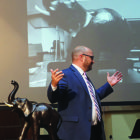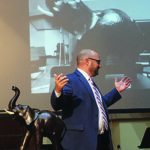
Sep 6, 2018
By Rev. David Stall, Conference President
- To summarize some of what we heard during the week, I will give some highlights. Garfield Miller asked if we are ready to answer the call to be true followers of Christ. Wayne North challenged us to get out there and actually minister to people, and remove obstacles that are in the way of that happening. Kevin Sorbo inspired us as he shared his testimony about standing up for truth and Christian values in a difficult environment, like Hollywood. Andy Samuels reminded us that we will have a harvest in accordance with what we have sown. Leith Anderson shared how God is moving and how we can be involved if we will be good stewards of what God has entrusted to us. Those are just some of the things we have heard. In addition, Lori Roeleveld inspired us throughout the week and talked about the art of hard conversations. All of this has been a good lead-in to a hard conversation that we need to have now about hard conversations in our churches.
- We need to address a significant and serious threat to our SDB churches and our future. I believe we have a silent killer, sort of like carbon monoxide, that has snuck in nearly undetected to our churches and put us in danger. This silent killer is our failure to address sin, accountability, apathy, and divisiveness through church discipline.
- Somewhere around 150 people have come and gone through our church (in Ashaway) in the last 8 years. About 50 of those people have left our church under some kind of negative circumstances like a difference in doctrine/theology, hostility or conflict, church discipline, or being asked to leave. Those numbers might sound extreme by SDB standards, especially since we started with just about 25 people in the church. How can a small church suffer that kind of loss, and still be growing with more than 100 active participants currently?
- There are two significant factors here. The first is that we steadily bring people in through outreach, evangelism, and active gospel ministry. The second is that we let people go, often through church discipline and defense of the integrity of the church. Oddly enough, both bringing people in AND letting people go are contributing to the numerical and spiritual growth of the church. I am talking about becoming a church that draws people in by being a church that lets people go. This concept may sound strange and foreign to us, but it shouldn’t. I believe it is Biblical and it is an idea that I learned from Seventh Day Baptists.
- For many years, I heard SDBs talk about covenant community, church covenants, and covenant membership. I learned from SDBs about living the Christian life together in covenant communities for the good of individual Christians and for the growth, strength, and purity of the church. As I understood this idea, it made great sense to me. It involves love, commitment, accountability, discipleship, and growth. I have been involved here at the Conference level, as an adult, for just over 20 years. It took me about 10 years to understand what SDBs were teaching and saying about covenant living. It took me another 10 years to realize that most SDB churches don’t actually do it. Imagine…there is something that we talk about as important and central to our Christian life, but we don’t actually do it.
- Our failure to address sin, accountability, apathy, and divisiveness through church discipline is slowly killing many of our churches. It’s a hard thing to do. Nobody wants to address the elephant in the room. Many people in our churches believe that the “worst thing ever” would be someone leaving the church. So, we let sin and bad behavior run free and even rule in the church—until the church becomes a place that repels new and true believers. Trying to keep the wrong people in our churches drives the right people out.
- Read Matthew 18:15-17 – Most of us are familiar with this passage about how to respond when someone sins against another person in the church. Though this may seem to address conflict between individuals, when it is not properly dealt with, this issue will become church conflict and church sin. Being faithful to carry out this “Matthew 18 process” is very hard but very important. In my experience, most people repent after the first or second step in this process. This brings resolution. If they don’t, and you arrive at step three, people often choose to leave the church rather than being forced out. This also brings resolution. Ultimately, the unrepentant person must go in order to protect the integrity and unity of the church. The love and hope in this is a love for Jesus and His church, and a hope that individuals might eventually be won back into good fellowship with Jesus and His church.
- Read 1 Corinthians 5 – In this familiar passage, Paul addressed sexual and relational sin in the church. We have all seen sexual sin in churches including sex before marriage, sex outside of marriage, homosexuality, sexual abuse, and other deviations from God’s plan. We often jump to making judgments about things going on in the outside world, or the world outside our own church. However, we fail to pass appropriate judgment inside the church and deal with the sexual sin issues among us. Paul wasn’t just addressing the sexual sin in the church, he was also addressing the church’s sin in not properly addressing the sexual sin! Like the church in Corinth, we must learn to deal with these issues in the church lovingly and swiftly. It seems that we often worry about how people will respond to loving church discipline. It is important to remember that their response is not up to us and cannot dictate the process by which we address their sin. Years ago, in our church, we had to address two different couples with very similar sin situations. Although our process was the same with both couples, we experienced nearly opposite results in the two cases. One couple was restored and has thrived, and the other couple rebelled and left. In both cases, I believe that biblical church discipline won and that the church acted according to biblical principles. The love and hope in this is a love for Jesus and His church, and a hope that individuals might be won back into good fellowship with Jesus and His church. The result of the process is always up to God.
- Read Titus 3:9-11 – This passage is a favorite of mine because it holds a simple truth that can greatly simplify church life. I’m sure that I’m not the only one who has run into a divisive contrarian within the church body. Some people just want to argue, create strife, and divide people. Some are absolutely trying to destroy the church or its leadership. Some are just sinful and difficult people who are unaware of the problems caused by their own actions. In some cases, a person has a different theological or doctrinal belief than those which the church holds. Other times a person just has problems with certain practices or processes that the church has adopted. Other times they have an issue with the church leadership or church culture. There is nothing wrong with lovingly and appropriately sharing a different view or respectfully raising a question. That’s not what I’m talking about. When a person decides, because of doctrine or some other issues, that they are not compatible with the church they are in, they have a decision to make. If their choice is to be divisive or destructive by continually creating arguments within the church, then church leaders should warn them…twice. If the person continues their divisive behavior, they should be thrown out of the church. The love and hope in this is a love for Jesus and His church, and a hope that individuals might be won back into good fellowship with Jesus and His church.
- This is so hard for us to do, especially in our small churches. Unfortunately, our reluctance to carry out biblical church discipline is what will keep many of our churches small and will eventually kill them. This is a culture change back to living out our faith in a culture of real covenant communities. SDBs never lost the idea of the importance of this, we just have not been doing it. We have said it and taught it, but have not lived it. In this essential area of church life and health, it is time for less talk and more action. Some of you will return home after Conference and find that the elephant in the room is still there. Perhaps you will notice the smell, and be more aware of how the church has been working around the elephant in the room rather than addressing it. Maybe some of you ARE the elephant in the room. My friends, it’s time to take action and do the right thing. Biblical church discipline is hard, but making this cultural change will fill your lives and churches with the love and hope of the gospel. If you get this right, you will grow, others will grow, and your churches will likely grow as well. Less talk. More action.



